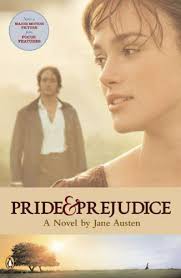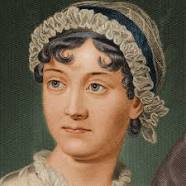Pride and Prejudice Page #19
Pride and Prejudice is a romantic novel by Jane Austen, first published in 1813. The story charts the emotional development of the protagonist, Elizabeth Bennet, who learns the error of making hasty judgments and comes to appreciate the difference between the superficial and the essential. The comedy of the writing lies in the depiction of manners, education, marriage, and money during the British Regency period.
In describing to her all the grandeur of Lady Catherine and her mansion, with occasional digressions in praise of his own humble abode, and the improvements it was receiving, he was happily employed until the gentlemen joined them; and he found in Mrs. Phillips a very attentive listener, whose opinion of his consequence increased with what she heard, and who was resolving to retail it all among her neighbours as soon as she could. To the girls, who could not listen to their cousin, and who had nothing to do but to wish for an instrument, and examine their own indifferent imitations of china on the mantelpiece, the interval of waiting appeared very long. It was over at last, however. The gentlemen did approach, and when Mr. Wickham walked into the room, Elizabeth felt that she had neither been seeing him before, nor thinking of him since, with the smallest degree of unreasonable admiration. The officers of the ----shire were in general a very creditable, gentlemanlike set, and the best of them were of the present party; but Mr. Wickham was as far beyond them all in person, countenance, air, and walk, as they were superior to the broad-faced, stuffy uncle Phillips, breathing port wine, who followed them into the room. Mr. Wickham was the happy man towards whom almost every female eye was turned, and Elizabeth was the happy woman by whom he finally seated himself; and the agreeable manner in which he immediately fell into conversation, though it was only on its being a wet night, made her feel that the commonest, dullest, most threadbare topic might be rendered interesting by the skill of the speaker. With such rivals for the notice of the fair as Mr. Wickham and the officers, Mr. Collins seemed to sink into insignificance; to the young ladies he certainly was nothing; but he had still at intervals a kind listener in Mrs. Phillips, and was by her watchfulness, most abundantly supplied with coffee and muffin. When the card-tables were placed, he had the opportunity of obliging her in turn, by sitting down to whist. “I know little of the game at present,” said he, “but I shall be glad to improve myself, for in my situation in life--” Mrs. Phillips was very glad for his compliance, but could not wait for his reason. Mr. Wickham did not play at whist, and with ready delight was he received at the other table between Elizabeth and Lydia. At first there seemed danger of Lydia's engrossing him entirely, for she was a most determined talker; but being likewise extremely fond of lottery tickets, she soon grew too much interested in the game, too eager in making bets and exclaiming after prizes to have attention for anyone in particular. Allowing for the common demands of the game, Mr. Wickham was therefore at leisure to talk to Elizabeth, and she was very willing to hear him, though what she chiefly wished to hear she could not hope to be told--the history of his acquaintance with Mr. Darcy. She dared not even mention that gentleman. Her curiosity, however, was unexpectedly relieved. Mr. Wickham began the subject himself. He inquired how far Netherfield was from Meryton; and, after receiving her answer, asked in a hesitating manner how long Mr. Darcy had been staying there. “About a month,” said Elizabeth; and then, unwilling to let the subject drop, added, “He is a man of very large property in Derbyshire, I understand.” “Yes,” replied Mr. Wickham; “his estate there is a noble one. A clear ten thousand per annum. You could not have met with a person more capable of giving you certain information on that head than myself, for I have been connected with his family in a particular manner from my infancy.” Elizabeth could not but look surprised. “You may well be surprised, Miss Bennet, at such an assertion, after seeing, as you probably might, the very cold manner of our meeting yesterday. Are you much acquainted with Mr. Darcy?” “As much as I ever wish to be,” cried Elizabeth very warmly. “I have spent four days in the same house with him, and I think him very disagreeable.” “I have no right to give my opinion,” said Wickham, “as to his being agreeable or otherwise. I am not qualified to form one. I have known him too long and too well to be a fair judge. It is impossible for me to be impartial. But I believe your opinion of him would in general astonish--and perhaps you would not express it quite so strongly anywhere else. Here you are in your own family.” “Upon my word, I say no more here than I might say in any house in the neighbourhood, except Netherfield. He is not at all liked in Hertfordshire. Everybody is disgusted with his pride. You will not find him more favourably spoken of by anyone.” “I cannot pretend to be sorry,” said Wickham, after a short interruption, “that he or that any man should not be estimated beyond their deserts; but with him I believe it does not often happen. The world is blinded by his fortune and consequence, or frightened by his high and imposing manners, and sees him only as he chooses to be seen.” “I should take him, even on my slight acquaintance, to be an ill-tempered man.” Wickham only shook his head. “I wonder,” said he, at the next opportunity of speaking, “whether he is likely to be in this country much longer.” “I do not at all know; but I heard nothing of his going away when I was at Netherfield. I hope your plans in favour of the ----shire will not be affected by his being in the neighbourhood.” “Oh! no--it is not for me to be driven away by Mr. Darcy. If he wishes to avoid seeing me, he must go. We are not on friendly terms, and it always gives me pain to meet him, but I have no reason for avoiding him but what I might proclaim before all the world, a sense of very great ill-usage, and most painful regrets at his being what he is. His father, Miss Bennet, the late Mr. Darcy, was one of the best men that ever breathed, and the truest friend I ever had; and I can never be in company with this Mr. Darcy without being grieved to the soul by a thousand tender recollections. His behaviour to myself has been scandalous; but I verily believe I could forgive him anything and everything, rather than his disappointing the hopes and disgracing the memory of his father.” Elizabeth found the interest of the subject increase, and listened with all her heart; but the delicacy of it prevented further inquiry. Mr. Wickham began to speak on more general topics, Meryton, the neighbourhood, the society, appearing highly pleased with all that he had yet seen, and speaking of the latter with gentle but very intelligible gallantry.
Translation
Translate and read this book in other languages:
Select another language:
- - Select -
- 简体中文 (Chinese - Simplified)
- 繁體中文 (Chinese - Traditional)
- Español (Spanish)
- Esperanto (Esperanto)
- 日本語 (Japanese)
- Português (Portuguese)
- Deutsch (German)
- العربية (Arabic)
- Français (French)
- Русский (Russian)
- ಕನ್ನಡ (Kannada)
- 한국어 (Korean)
- עברית (Hebrew)
- Gaeilge (Irish)
- Українська (Ukrainian)
- اردو (Urdu)
- Magyar (Hungarian)
- मानक हिन्दी (Hindi)
- Indonesia (Indonesian)
- Italiano (Italian)
- தமிழ் (Tamil)
- Türkçe (Turkish)
- తెలుగు (Telugu)
- ภาษาไทย (Thai)
- Tiếng Việt (Vietnamese)
- Čeština (Czech)
- Polski (Polish)
- Bahasa Indonesia (Indonesian)
- Românește (Romanian)
- Nederlands (Dutch)
- Ελληνικά (Greek)
- Latinum (Latin)
- Svenska (Swedish)
- Dansk (Danish)
- Suomi (Finnish)
- فارسی (Persian)
- ייִדיש (Yiddish)
- հայերեն (Armenian)
- Norsk (Norwegian)
- English (English)
Citation
Use the citation below to add this book to your bibliography:
Style:MLAChicagoAPA
"Pride and Prejudice Books." Literature.com. STANDS4 LLC, 2025. Web. 11 Jan. 2025. <https://www.literature.com/book/pride_and_prejudice_9>.




Discuss this Pride and Prejudice book with the community:
Report Comment
We're doing our best to make sure our content is useful, accurate and safe.
If by any chance you spot an inappropriate comment while navigating through our website please use this form to let us know, and we'll take care of it shortly.
Attachment
You need to be logged in to favorite.
Log In